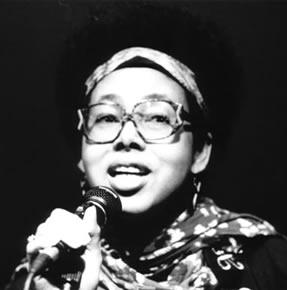Grace Nichols -
Hurricane Hits England
Grace Nichols was born in Guyana in 1950 but came to live in England in 1977. At first – like Alvi and Bhatt – she felt uncomfortable with English culture, but later she was reconciled to living in England and now feels comfortable in both England AND the Caribbean.
In its content, the poem tells of the time when Nichols was kept awake during the ‘hurricane’ that hit England in 1987. The poem begins by describing how the storm reminded her of the great hurricanes of her childhood in the Caribbean – e.g. ‘Hattie’ – and the wind and storm gods – ‘Hurracan’, and ‘Oya’ and ‘Shango’ – that the people of Caribbean believed caused them
Nichols then raises a succession of questions – why have the hurricane-gods come to England? What is the meaning of it? ‘Why is my heart unchained?’
Finally, she welcomes the hurricane gods, and decides that they have come to let her know that they are here in England as much as they ever were at home in the Caribbean, and ‘the earth is the earth’ wherever you live.
The feelings of the poet about the storm are mixed. Nichols describes it as ‘fearful and reassuring’ – it was dangerous and it frightened her as any fierce storm would do – but at the same time it brought back happy memories of her childhood. In the poem, Nichols calls the storm: ‘my sweeping back-home cousin’.
Nichols describes how the storm rekindled the past in her: ‘tropical Oya … I am aligning myself to you’; this shows that she made a conscious effort to remember how happy she was with her native Caribbean beliefs and culture.
But at the same time, the poem reconciled her to England. She writes: ‘the earth is the earth is the earth’, meaning that it is the same world, wherever you happen to live. She felt comforted and reassured. She realised that the same gods who guided her life in Guyana were present in England too, so she need not feel alone or alienated. At a later time she wrote: ‘It seemed as though the old gods were in the wind, and for the first time, I felt close to the English landscape’.
As a result, she can be happy, and when she asks the question: ‘Oh why is my heart unchained?’ the poem shows that the experience left her exhilarated and excited, happy and feeling free. This question is an allusion to West Indian slaves’ chains – Grace was ‘freed’ to live happily in England, just as the slaves had been set free from their slavery back in Guyana.
In its structure, the poem is written as free verse, with stanzas of varying length. This un-constrained and irregular style is designed to reflect the freedom she found, but it also symbolises the unpredictability of a storm.
Although there is no formal metre, the words have a noticeable rhythm – for example in the repetition of ‘Talk to me … Talk to me … Talk to me …’, or in the similar phrasing of ‘I am aligning … I am following … I am riding’. In this, the poem reminds the reader of Half-Caste by John Agard (who was also born in Guyana, and who is her partner), and it reminds the reader of the Caribbean limbo dancing and Caribbean culture which the poet had been missing, but which had now ‘come to her in England’ (and thus she is uses it in her poem).
In its use of language, the poem starts off in third person: ‘It took a hurricane to bring her closer’ – this creates a sense of distance at the start, which helps the reader feel how estranged and distant Nichols was from English culture before the storm changed her feelings.
Quickly, however, the poem moves to the first person, conveying the process by which she personalised the message of the hurricane so it affected her. She talks directly to the storm, personifying it: e.g. ‘Talk to me Hurracan’, emphasising how the storm ‘spoke’ to her, and changed her way of thinking.
During the poem, Nichols poses a series of questions – for example: ‘O why is my heart unchained?’ This is designed to show the internal dialogue by which the storm helped her re-think what she felt about England.
In the poem, Nichols calls the gods by their names in the Caribbean patois (‘Hurracan’) and original African language (‘Oya’ and ‘Shango’). They are echoes of her past in the Caribbean (the ‘ancestral spectre’) which had now come to comfort her in England.
Nichols uses images which relate to the storm, but also to her personal life-changing experience. She writes about: ‘old tongues reaping havoc’ by which she means the wind, but the word ‘tongue’ (as in Bhatt) also reminds us of her old Caribbean patois. She refers to the ‘blinding illumination’, by which she means the lightning of the storm, but also her inner realisation that ‘the earth is the earth’. And she describes how uprooted trees were ‘falling heavy as whales’, which describes what actually happened in the storm, but also shows us how her inner feelings and beliefs had been shaken and uprooted by the experience.
My feelings when I read the poem, are to remember how a storm makes you realise the power of Nature, and it makes me wonder whether I would be happy to go and live in a different country and culture.
© Claire McNamee, by permission
Links
Text of the poem with specialist terms explained - and you can LISTEN to Nichols reading her poem!
Revision Notes - inc. the poem, a notes-grid and the essay.
